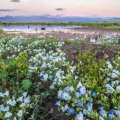International marine and climate change experts will be meeting at The University of Queensland’s Heron Island research station later this month to examine the latest episode of coral bleaching.
Coral bleaching is a damaging whitening of coral that occurs when a symbiotic algae essential to coral health becomes damaged in a way akin to sunburn.
Director of UQ’s Centre for Marine Studies, Professor Ove Hoegh-Guldberg said relatively high sea temperatures on the Great Barrier Reef this year has heightened concerns that a large part of the Reef may be destroyed.
“Coral bleaching and climate change are the largest threat to coral reefs,” Professor Hoegh-Guldberg said.
“In 1998 alone, an estimated 16% of the world’s coral reefs died. This has nations all over the world alarmed. If these warming events are on the increase due to climate change, then serious problems are in the making.”
The meeting on Heron Island this month is a working group convened by the Intergovernmental Oceanographic Commission of UNESCO and the World Bank (IOC/UNESCO-WB). It will involve more than 30 scientists from over 20 nations.
“It is aiming to do experiments and collect information on the current bleaching event that has expanded over the past month to include reefs across the entire Great Barrier Reef,” said Professor Hoegh-Guldberg, who is also the working group chair.
Dr Bill Leggat, also from UQ’s Centre for Marine Studies, is planning to study the biochemical damage that occurs within the symbiotic algae within reef-building corals.
“What we know is that the algae, which are essential to coral health, become dysfunctional and die when it gets warm. We need to find out why this happens during this expedition. If we know this, then perhaps we can explore whether there are resistant strains of symbiotic algae out there on the reef.”
The experiments associated with the IOC/UNESCO-WB research expedition start on Feb 25 and continue through to March 18.
Representatives from the Great Barrier Reef Marine Park Authority, the peak management authority, will be in attendance.
Media: For more information contact Lorraine Parkin at the UQ Centre for Marine Studies (tel. 07 3346 9041 or 0412 900 928) or Peter McCutcheon at UQ Communications (tel. 07 3365 1088 or 0413 380 012)
.jpg)



